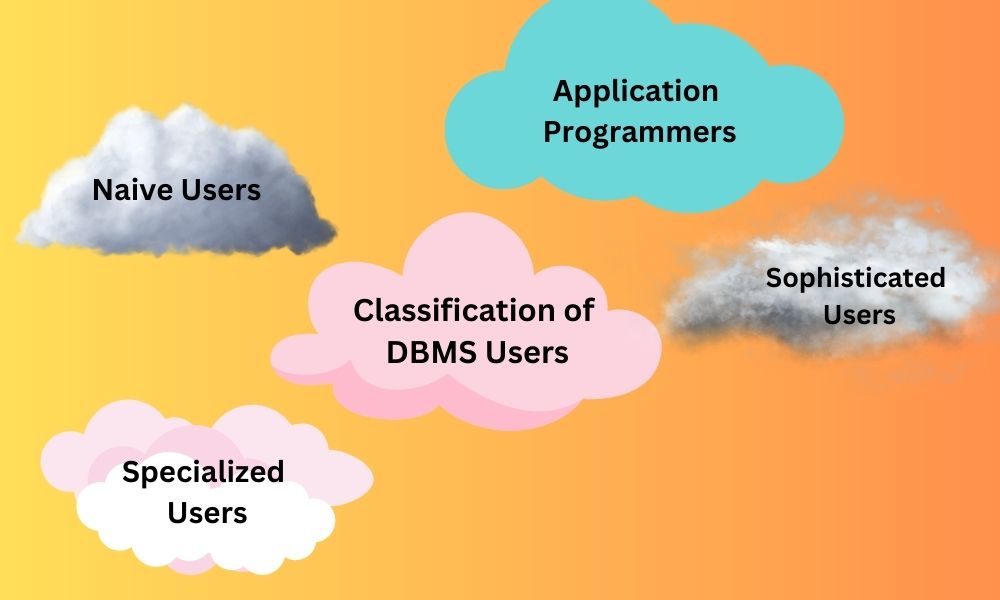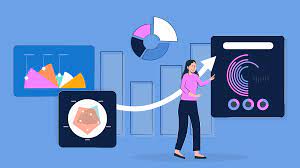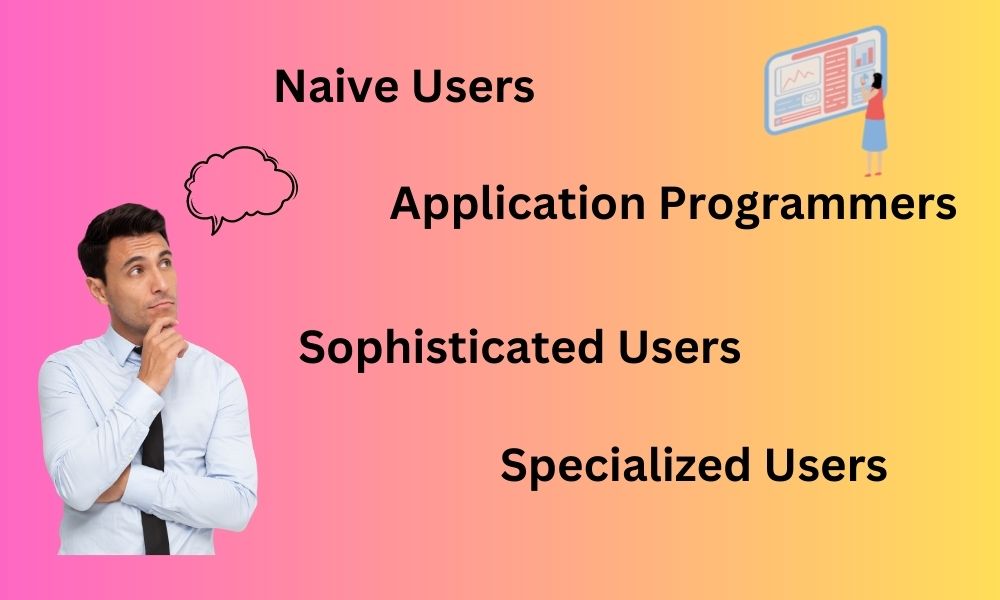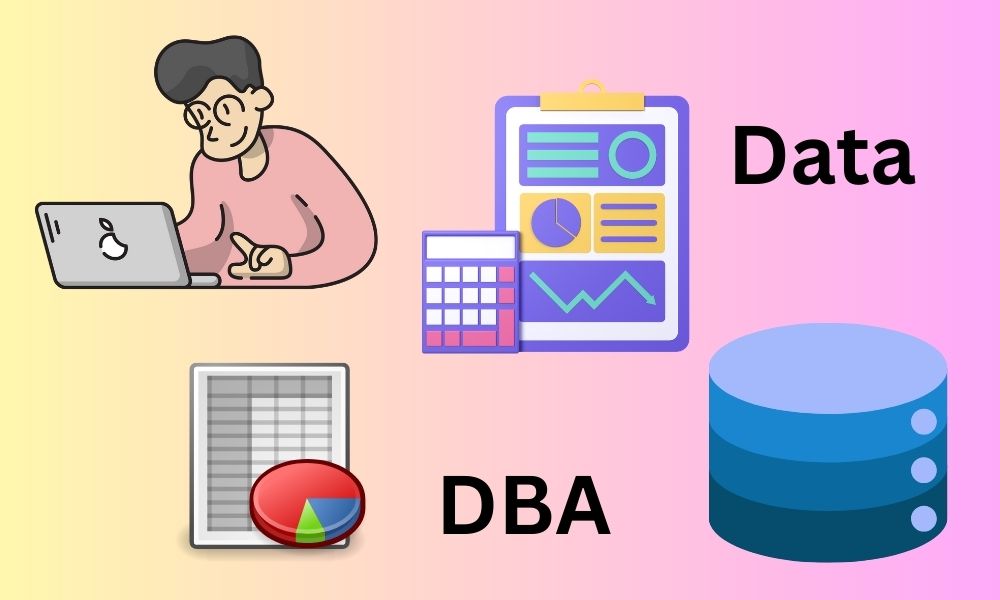The database can be accessed in many forms and by different varieties of users. As we know data is very important and is generated everywhere. So, in this article, we will be discussing the Classification of DBMS Users.
Now, let’s have a look at the Classification of DBMS Users.
Classification of DBMS Users
DBMS Users are basically classified into 4 broad categories and called as Classification of DBMS Users and those are:
- Naive Users
- Application Programmers
- Sophisticated Users
- Specialized Users
Now let’s try to understand each of these DBMS Users in detail or let’s talk about the Classification of DBMS Users in detail.
See also, Functional Dependency in DBMS
1) Naive Users
This is the 1st category under the Classification of DBMS Users. Naive as the name suggests that the Users have no knowledge about the database, but have to work very frequently with the system. But you must be wondering how is this possible.
Ok, so let’s take some examples:
Think, a user went to an ATM machine to withdraw some money, now it is not important to know about the SQL or the database for the same. that simply means it is not important to have the technical knowledge in this case, but the user can frequently use the system.
Let’s take one more example, like nowadays no one goes to the railway station and book the tickets, all of them book online by visiting a website. So, now in this case also not mandatory to know the technical details that how the ticket is being booked with just some clicks, it’s like users should know only the process of how to book and then they can book their tickets online.
So, Naive Users are categorised as Unsophisticated users who don’t have technical knowledge, anyways they don’t need to know technical knowledge for using the system. All they need to know is how to use the system. This is one of the important categories under the Classification of DBMS Users.
Examples of Naive users are clerks, tellers, etc. Like if you visited a bank then the bank employee will provide the information to you by looking into the database, but they won’t provide the SQL query in order to fetch the data from the database.
Now in this modern world, it becomes very easy to access all this information without actually getting into the database, as many web interfaces, Mobile interfaces, and UI interfaces are available.
Main Article: What is DBMS Architecture?
2) Application Programmers
This is the 2nd category under the Classification of DBMS Users. Naive Users use the Applications in order to get their work done, but from where this application comes from, who has actually written the code for the same, who has actually built this? so now comes the applications programmers who have created these applications which are being used by the Naive Users. These application programmers are also known as software developers.
Application Programmers are computer professionals who are specialised in the development of the software. These software are built by writing codes. Application Programmers know some programming language which is used to build software or applications. Also, they use some of the application development tools for the same.
Their main job is to develop user interfaces which are easy to access by the end users. Applications or software should be user-friendly as it will also be used by Naive Users. This is one of the important categories under the Classification of DBMS Users.
3) Sophisticated Users
This is the 3rd category under the Classification of DBMS Users. Naive users were in the category of Unsophisticated users, and now come the Sophisticated users who know about all the corners of the system. Sophisticated users know how to interact with the system, as well as he/she has all the technical knowledge as well.
An example of a Sophisticated user is the Database Administrator like he/she knows the SQL language, which is used to write complex queries and fetch data from the database. SQL is called the database query language which is used to get the proper data as per the requirements from the database.
Sophisticated users also know how to work with data analysis software as it helps in visualizing the data. This is one of the important categories under the Classification of DBMS Users.
What is Data Visualization?
Data visualization is the graphical representation of the complex data and information present in the database. It uses graphics and many visual elements like charts, and plots to represent the information from the data. Then it becomes easy to understand the complex data.
It is mainly used by businesses to get information about their business activities. It also helps in taking relevant and accurate decisions at the correct time based on several activities.
Data and Business Analysts also come in the category of Sophisticated users.
4) Specialized Users
This is the 4th category under the Classification of DBMS Users. The name itself tells that these are the users with some special knowledge or access. Like these users specialized in DB Applications.
They don’t only know how to write the SQL query for accessing the data, but they are also aware of Computer-aided design systems. They have a strong knowledge base and are experts in running the systems.
They not only access the database, but they are the ones who create the database, they are the ones who create the tables, and they are the one who defines the rules for logging the data in the database.
They not only access the text i.e., normal data, but also plays with the multimedia data. Multimedia data is all about like video data, audio data, text, animation, graphics and images, etc.
Specialized users mainly work on the projects in real-time which is responsible to log the data in a well-defined manner into the database. These projects will be deployed and also will be used until the next generation and so on.
This is one of the important categories under the Classification of DBMS Users.
See also, What is Data Independence in DBMS?
Database Administrators – DBA
Among these 4 different Classification of DBMS Users. The main one is the database administrator. Database Administrators are also known as DBA. Any organization or company dealing with any kind of data or having a database will also have a database administrator.
DBA is one of the most important categories under the Classification of DBMS Users. Data administrators are the ones who are responsible for any activities being done on the database. Data Administrator has complete privilege over the entire database. He/she has full control of the central system.
DBA plays a crucial role in the Classification of DBMS Users.
The function of the Data Administrator
- To define Schema, Schema can contain multiple tables.
- DBA has to define the structure of the storage, and also all the access methods definition.
- DBA can modify the schema or the structure of the tables.
- DBA can grant authorization for data access. He/She is the one who decides what data a manager can access, what data a clerk can access, or what data a particular person can access.
- DBA is the only one who is responsible for the routine maintenance of the database.
Routine maintenance basically includes
- Periodic Backup of the database: It is very important because if some uncertainty happens in the main system, then we should always have our data safe.
- Disk Space Management: If the data overflows in that case.
- DBA should also monitor the performance of the databases.
Classification of DBMS Users is one of the most important topics to understand. As data is being generated every single second, almost all the person directly or indirectly connected with the different forms of data and access that. So, they must know in which category they lie that is what is being discussed in this article i.e., Classification of DBMS Users.



